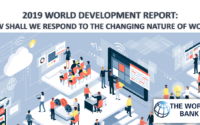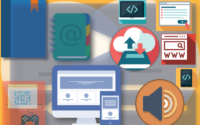
Download Report: Mobile Technology and Home Broadband 2019
37% of Americans now go online mostly using a smartphone, and these devices are increasingly cited as a reason for not having a high-speed internet connection at home Pew Research Center
Premier Portal for Professionals Since 1995, Covering Technology-Based Education

37% of Americans now go online mostly using a smartphone, and these devices are increasingly cited as a reason for not having a high-speed internet connection at home Pew Research Center

The online student population is rapidly growing in size and complexity. While a growing number of prospective students creates enrollment opportunities, a school’s success can also depend on tailoring their programs and services to the motivations and needs of today’s online learners. To access insights that illuminate how to engage this unique population, register for […]

Innovating Pedagogy 2019: Exploring new forms of teaching, learning and assessment, to guide educators and policy makers This series of reports explores new forms of teaching, learning, and assessment for an interactive world, to guide teachers and policy makers in productive innovation. This seventh report proposes ten innovations that are already in currency but havenot […]

Work is constantly reshaped by technological progress. Firms adopt new ways of production, markets expand, and societies evolve. But some changes provoke more attention than others, in part due to the vast uncertainty involved in making predictions about the future. The 2019 World Development Report analyzes these changes and what governments can do about them. […]

EDUCAUSE is proud to continue the tradition of excellence begun by the New Media Consortium’s (NMC) work on the Horizon Report. The report serves as a reference and technology planning guide for educators, higher education leaders, administrators, policy makers, and technologists. his report profiles six key trends, six significant challenges, and six important developments in […]

The literal distance inherent in online education can be an important difference between it and traditional classroom settings, such that proximate, on-site learning is thought to be where experiential, transformative education happens (Cohen, 2013). Yet it is possible that some of the most compelling, effective aspects of traditional, proximate education are transferable, and are actively […]

In 2009 the Washington State Legislature created an accountability system for online learning (SSB 5410, RCW 28A.250.005). The Legislature directed the Office of Superintendent of Public Instruction (OSPI) to develop an online provider approval system and report annually on the state of online learning in Washington (RCW 28A.250.040). The Legislature asked OSPI to include: (1) […]

Millions of dollars are being invested in “digital literacy,” “digital skills,” and “digital readiness” programs across different sectors and countries. Nevertheless, such efforts have limited coordination and are uneven across covered topics due to the lack of a globally shared understanding and framework for digital competencies and standards. Digital Intelligence (DQ) is a comprehensive set of […]

2019 The Changing Landscape of Online Education (CHLOE): Behind the Numbers This report is the continuation of a multi-year study by QM and Eduventures to examine the changing landscape of online education, provide results to those who can use them and help those involved with online education place their institution within a broader context and possibly influence strategic decisions […]